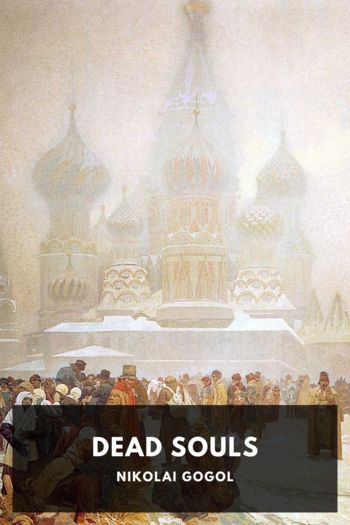Dead Souls - Nikolai Gogol (most life changing books .txt) 📗

- Author: Nikolai Gogol
Book online «Dead Souls - Nikolai Gogol (most life changing books .txt) 📗». Author Nikolai Gogol
Yet which of you, when quiet, and alone, and engaged in solitary self-communion, would not do well to probe your own souls, and to put to yourselves the solemn question, “Is there not in me an element of Chichikov?” For how should there not be? Which of you is not liable at any moment to be passed in the street by an acquaintance who, nudging his neighbour, may say of you, with a barely suppressed sneer: “Look! there goes Chichikov! That is Chichikov who has just gone by!”
But here are we talking at the top of our voices whilst all the time our hero lies slumbering in his britchka! Indeed, his name has been repeated so often during the recital of his life’s history that he must almost have heard us! And at any time he is an irritable, irascible fellow when spoken of with disrespect. True, to the reader Chichikov’s displeasure cannot matter a jot; but for the author it would mean ruin to quarrel with his hero, seeing that, arm in arm, Chichikov and he have yet far to go.
“Tut, tut, tut!” came in a shout from Chichikov. “Hi, Selifan!”
“What is it?” came the reply, uttered with a drawl.
“What is it? Why, how dare you drive like that? Come! Bestir yourself a little!”
And indeed, Selifan had long been sitting with half-closed eyes, and hands which bestowed no encouragement upon his somnolent steeds save an occasional flicking of the reins against their flanks; whilst Petrushka had lost his cap, and was leaning backwards until his head had come to rest against Chichikov’s knees—a position which necessitated his being awakened with a cuff. Selifan also roused himself, and apportioned to the skewbald a few cuts across the back of a kind which at least had the effect of inciting that animal to trot; and when, presently, the other two horses followed their companion’s example, the light britchka moved forwards like a piece of thistledown. Selifan flourished his whip and shouted, “Hi, hi!” as the inequalities of the road jerked him vertically on his seat; and meanwhile, reclining against the leather cushions of the vehicle’s interior, Chichikov smiled with gratification at the sensation of driving fast. For what Russian does not love to drive fast? Which of us does not at times yearn to give his horses their head, and to let them go, and to cry, “To the devil with the world!”? At such moments a great force seems to uplift one as on wings; and one flies, and everything else flies, but contrariwise—both the verst stones, and traders riding on the shafts of their wagons, and the forest with dark lines of spruce and fir amid which may be heard the axe of the woodcutter and the croaking of the raven. Yes, out of a dim, remote distance the road comes towards one, and while nothing save the sky and the light clouds through which the moon is cleaving her way seem halted, the brief glimpses wherein one can discern nothing clearly have in them a pervading touch of mystery. Ah, troika, troika, swift as a bird, who was it first invented you? Only among a hardy race of folk can you have come to birth—only in a land which, though poor and rough, lies spread over half the world, and spans versts the counting whereof would leave one with aching eyes. Nor are you a modishly-fashioned vehicle of the road—a thing of clamps and iron. Rather, you are a vehicle but shapen and fitted with the axe or chisel of some handy peasant of Yaroslav. Nor are you driven by a coachman clothed in German livery, but by a man bearded and mittened. See him as he mounts, and flourishes his whip, and breaks into a long-drawn song! Away like the wind go the horses, and the wheels, with their spokes, become transparent circles, and the road seems to quiver beneath them, and a pedestrian, with a cry of astonishment, halts to watch the vehicle as it flies, flies, flies on its way until it becomes lost on the ultimate horizon—a speck amid a cloud of dust!
And you, Russia of mine—are not you also speeding like a troika which nought can overtake? Is not the road smoking beneath your wheels, and the bridges thundering as you cross them, and everything being left in the rear, and the spectators, struck with the portent, halting to wonder whether you be not a thunderbolt launched from heaven? What does that awe-inspiring progress of yours foretell? What is the unknown force which lies within your mysterious steeds? Surely the winds themselves must abide in their manes, and every vein in their bodies be an ear stretched to catch the celestial message which bids them, with iron-girded breasts, and hooves which barely touch the earth as they gallop, fly forward on a mission of God? Whither, then, are you speeding, O Russia of mine? Whither? Answer me! But no answer comes—only the weird sound of your collar-bells. Rent into a thousand shreds, the air roars past you, for you are overtaking the whole world, and shall one day force all nations, all empires to stand aside, to





Comments (0)